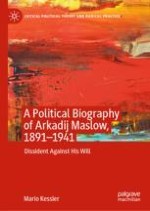
2020 | OriginalPaper | Chapter
A Young Revolutionary Between Russia and Germany
Author : Mario Kessler
Published in: A Political Biography of Arkadij Maslow, 1891-1941
Publisher: Springer International Publishing
Activate our intelligent search to find suitable subject content or patents.
Select sections of text to find matching patents with Artificial Intelligence. powered by
Select sections of text to find additional relevant content using AI-assisted search. powered by